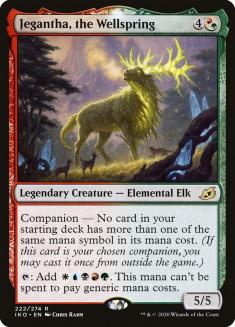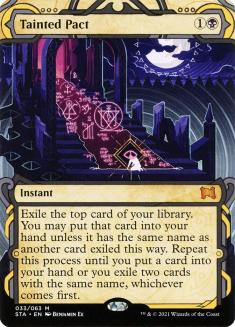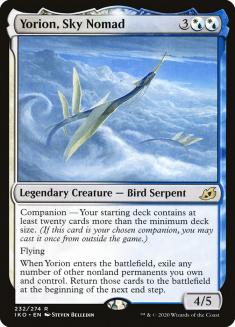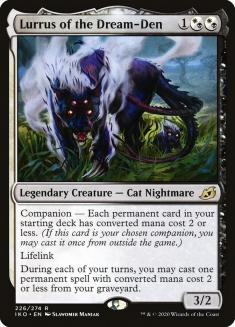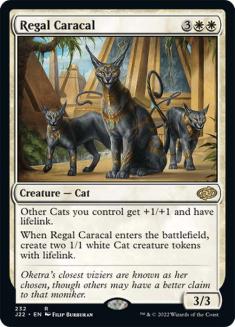As we anticipate an announced change regarding the functionality of companions on June 1, we might wonder whether the companion mechanic is salvageable and what it would take to make these cards have a positive impact on the game. I’d like to come back to what I think needs to be considered in modifying the existing companion rules, but I’d like to start with the bigger question of how this mechanic should have been designed. As I’ve written before, I think companions were fundamentally a bad idea, but I want to look at whether there was anything good that could have been salvaged from their goals given the constraints that exist. Let the record show that, at the time of writing this sentence, I don’t have an answer to that question, but I intend to work through it now.
The goal of companions was to provide an incentive for following optional deckbuilding conditions. So far, I think there’s a lot of potential in this space. You can increase fun and diversity by encouraging people to build decks they wouldn’t normally build, and if you get the balance right, those can be some among many decks. So somewhere in here, there’s potential for something positive, so the question is whether the constraints can be navigated in a healthy way.
The biggest constraint is verifiability. You could design a Lightning Bolt that deals four damage instead of three if your deck contains no sorceries, but if two kids are playing on a lunch table at school, where there are no deck checks, and one of them casts it and says it deals four, the other kid has no way of knowing if that’s true without looking at the first kid’s deck, which that kid has no reason to have to reveal.
This violates an unwritten rule about the amount of trust that should be required to play the game — the same reason that every card that searches a library for a card with certain conditions requires revealing that card. Companions avoid this by being revealed at the start of the game, such that you could never get away with playing with a card that violated their condition, whereas with the no-sorcery Lightning Bolt, someone might cast it as if it said, “If you haven’t cast a sorcery spell, you may have this card deal four damage. If you do, you can’t cast sorcery spells for the rest of the game.”
You could decide that that level of trust is fine to introduce, given that tournaments have decklists and deck checks and more are happening digitally where more things are being verified, but I’d suggest that thinking about it in the context of limited highlights the problem. I’ve definitely had drafts where I drafted a Jegantha, the Wellspring and at some point forgot about the restriction and picked up a Frostveil Ambush with the intent to play it because the restriction comes up infrequently enough that I ignored it. If I missed it and played my deck that way in paper, my opponent could always catch it, but if Jegantha wasn’t revealed at the beginning of the game, I could easily accidentally break the rules in games where only one card came up before finding my mistake, and that would definitely create some bad experiences.
So a good first step to addressing the issue of verifiability is to make cards that are revealed at the start of the game. This is an effective step, but not the only possible solution. For example, another option could be a spell with “As an additional cost, reveal your library,” but that’s not a fun mechanic, both because it’s potentially clunky and time-consuming for the opponent to verify and because it just takes away a lot of what’s cool about Magic — the hidden information.
Another possibility is to design cards that incentivize you to follow their rules rather than requiring you do something to receive a bonus (“If your graveyard contains no cards with even mana costs,” for example). The easiest way to satisfy this condition is to play with no even mana costs. You wouldn’t strictly have to play with no even costs, but when and how much to break their rules could also be an interesting deckbuilding question. Tainted Pact is an example of a pretty cool card that does this kind of thing, and I’d be happy to see more cards like it.
What kind of benefit would these cards provide? Honestly, that’s not the point. The point is to find whatever power level is appropriate for their benefit such that players are encouraged to try to build to the restriction, but that not everyone does that.
That last point is huge. If you’re designing in this space, it can be a cool way to get players to build decks they wouldn’t otherwise build or to care about cards with characteristics they might otherwise ignore, but if any of the payoffs are too strong, you end up soft-banning every card that doesn’t fit the conditions.
I believe that means it’s a fact of this mechanic that it has to be targeted at “Tier 2” decks. It’s fun if it lets someone justify doing something quirky, but horrible if it makes everyone do it. This fact was the biggest failure of the implementation of companion that we saw in Ikoria.
So is the problem simply that the power level was off? I don’t play Hearthstone but I’ve read a lot of tweets about how Wizards of the Coast (WotC) should have known companion was a bad idea because it caused problems in Hearthstone, but from what I’ve read, it seems like that was also an issue that they just pushed to power level high enough that everyone did it.
This leads to another question. Is it good to make a mechanic that’s designed to be not good enough? I think the answer to this is pretty simply yes. Not every card is designed for Spike or for high-level competitive Constructed play, and that’s totally fine.
So what is the right power level for companion and how can they know they’re hitting it?
As printed, I’d say Jegantha is a little worse than starting with a random extra card in your hand and Yorion, Sky Nomad and Lurrus of the Dream-Den are more like starting by palming your best card. If we ignore that and round the payoff down to “start the game with an extra card,” WotC should already know almost exactly what kind of win percentage benefit that is, since it’s roughly the opposite of taking a mulligan. The deckbuilding cost needs to hurt them in a way that decreases their win percentage by an amount they expect to be greater than that number, since you want this mechanic to come in weak and you need to account for deckbuilding solutions you as a designer failed to consider.
Companion as designed falls so far short of that goal that it looks like they weren’t trying or weren’t thinking of the problem along these lines at all. Companion as printed looks like it was designed to be overpowered with the expectation that roughly everyone will have to play one of them and the hope that the one people choose breaks in such a way that players choose a relatively diverse mix of companions.
No part of that is reasonable or responsible, and I genuinely can’t wrap my head around the implementation of the mechanic that doesn’t make me lose confidence in everyone involved in the decision (this isn’t to say that they should be replaced, but at the very least I hope this has taught some humility about the reckless direction Development has been moving.)
Personally, I think Todd Anderson‘s success with decks built by his Twitch chat is good anecdotal evidence that deckbuilding constraints aren’t necessarily that detrimental to win rates. There are a lot of ways to build reasonable Magic decks, and fundamentally, the reward of an extra card, particularly a strong card, is just way too big.
One of the stated constraints for companion was that they wanted the cards to be playable as cards players could put in their deck in addition to being playable as companions. Having played with them in Limited a lot, I get how this creates some cool tensions there, but it’s just not even close to worth it, at least not with the companion rule they settled on. If companion had to be a bonus card, that card had to be incredibly weak.
Here’s a solution I think might have been a cool alternative that could have met every goal:
Every companion essentially offers an emblem as a bonus card, except it’s easy to interact with. This gives you basically unlimited ability to fine-tune the power of the card as a companion (setting whatever static ability you want) that’s a completely separate knob from setting the power of the card as a card in your deck (power/toughness/casting cost). The first time around, I’d want to lean toward offering really trivial benefits, and if those didn’t hit, then I might try again with slightly stronger static abilities, but I’d be aware that this design space requires more caution than most.
“Cats you control have lifelink” is an emblem I’m perfectly comfortable letting my opponent start with if they want to play a deck that only has Cat creatures, at least if I can stop that ability with a removal spell. Yet it would still give someone a reason to look at whether they can find enough Cats to build a Cat deck, so that’s the kind of ability I’d look for, and I think that mechanic could be purely good for Magic. By keeping the power level weak, you actually increase the amount of fun in the challenge of making it work because the problem doesn’t get solved. People keep trying to find a way to build a good enough Cat deck because others haven’t succeeded.
The charm of the mechanic is completely gone as soon as any deck breaks any of them, as we’re currently experiencing. So what does that mean for the mechanic as it was printed? Is it possible to salvage?
WotC has a policy of not issuing power level errata because players should be able to trust their cards to say what they do. This is a good policy that makes the game playable. Companion offers some wiggle room because the full text of the mechanic isn’t printed on the cards. The words as written are nonsense if you don’t know the companion rules. This means these cards can receive functional power level errata, unlike other cards, by changing the rules about companion, which is great news if you want to save the game without banning ten new cards. Fortunately, it looks like WotC is on board:
My hope is that “address the companion mechanic” means “change how it works in a way that nerfs all companions,” and I think that’s a realistic hope. So what might such a change look like?
The biggest constraint is the reminder text of companion:
If this card is your chosen companion, you may cast it once from outside the game.
I’m not sure what the policy is on how precisely the reminder text has to match the functionality because this kind of thing has never happened before, so there isn’t really a policy. That reminder text potentially leaves some wiggle room, but it’s tricky. Some players have suggested that companions should replace a card in your hand since it’s a problem that discard can’t interact with them, but that would certainly not match the reminder text at all. Fortunately, I think there’s some wiggle room in the “if this card in your chosen companion” clause, in that I think it’s reasonable to create a rule about the costs of choosing a companion. I don’t think it would be entirely out of bounds to create a rule that says “If a player chooses a companion, that player only draws six cards at the beginning of the game,” for example.
While part of me wants to see them all banned just as an acknowledgement that this was all a horrible mistake, I think a change like what I wrote above is probably the best solution at this point. If companions aren’t an extra card, we can at least start asking questions about when it’s appropriate to build around them. Is this too much of a nerf? I don’t think so. Remember, I think the target should be minimal competitive use, and I think this is meaningfully different from outright banning the mechanic. Gyruda, Doom of Depths combo, for example, especially in Legacy with Lion’s Eye Diamond, could still be worth playing as a unique deck without the benefit of an eight-card opening hand.
If a change is happening, I really don’t see the point of a half measure, so I think almost exactly this is the most likely outcome, and probably the best outcome. I don’t think it’s the best possible implementation of the idea of a reward for meeting deckbuilding requirements, but I think a change to the mechanic that weakens those cards, probably by removing the additional resource, is the best we can make of the mistakes that have been made.



